|
|
| Sei in: Cinema e Medioevo ® Indice alfabetico dei film |
GIOVANNA LA PAZZA
2002, regia di Vicente Aranda
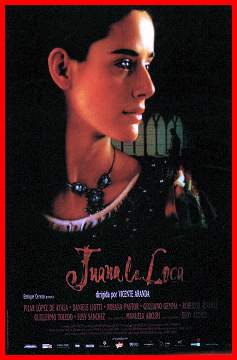
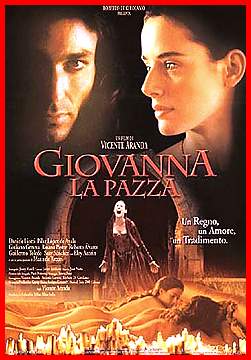
Scheda: Nazione: Spagna-Portogallo-Italia - Produzione: Enrique Cerezo Producciones Cinematográficas S.A., Pedro Costa S.A., Production Group, Take 2000 - Distribuzione: Columbia Tristar Film Italia, Alfa Films, Mongrel Media, Sony Pictures Classics, Warner Sogefilms - Sceneggiatura: Vicente Aranda, Barbara Di Girolamo, Antonio Larreta - Fotografia: Paco Femenia - Montaggio: Teresa Font - Scenografie: Miguel Chang - Costumi: Javier Artiñano - Musiche: José Nieto - Formato: super 35mm Technicolor - Durata: 123'.
Cast: Pilar López de Ayala, Daniele Liotti, Manuela Arcuri, Eloy Azorín, Rosana Pastor, Giuliano Gemma, Roberto Álvarez, Carolina Bona, Chema de Miguel, Andrés Lima, Guillermo Toledo, Cipriano Lodosa, Susi Sánchez, Héctor Colomé, Jorge Monge, Sol Abad, Cristina Arranz, Cristina Perales, Maria Ballesteros, Sonia Madrid, Cristina Solano.
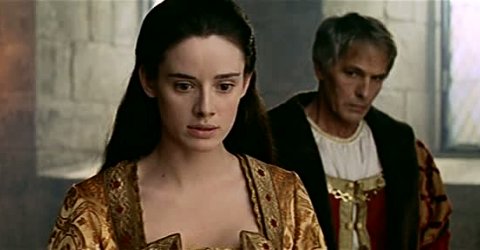
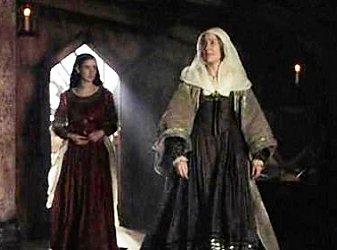

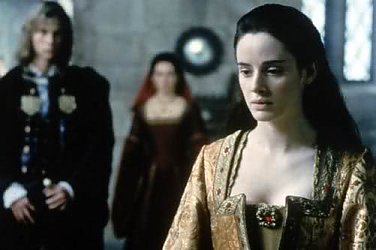
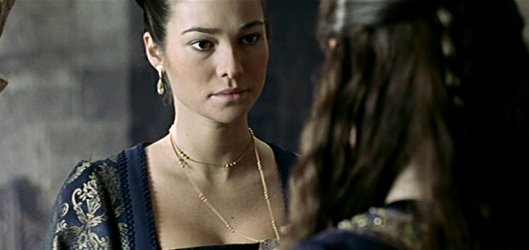
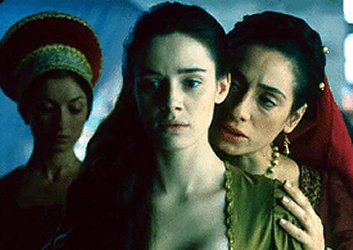
![]() Trama e commenti: mymovies.it
-
film.spettacolo.virgilio.it
-
kataweb.it
-
cinematografo.it:
«Il 22 agosto del 1496 parte da Laredo una
flotta diretta verso le Fiandre: l'infanta Giovanna, figlia di Isabella di
Castiglia e Ferdinando d'Aragona, deve incontrare il suo promesso sposo Filippo,
figlio dell'imperatore Massimiliano. L'incontro è folgorante, è attrazione
fatale e i due dimenticano i loro obblighi politici,
abbandonandosi ai loro sentimenti. Ma la morte dei fratelli prima e della madre
poi, fanno di Giovanna l'unica erede al trono e tali avvenimenti scateneranno
una battaglia politica fra nobiltà castigliana e fiamminga, e una battaglia fra
Giovanna e Filippo».
Trama e commenti: mymovies.it
-
film.spettacolo.virgilio.it
-
kataweb.it
-
cinematografo.it:
«Il 22 agosto del 1496 parte da Laredo una
flotta diretta verso le Fiandre: l'infanta Giovanna, figlia di Isabella di
Castiglia e Ferdinando d'Aragona, deve incontrare il suo promesso sposo Filippo,
figlio dell'imperatore Massimiliano. L'incontro è folgorante, è attrazione
fatale e i due dimenticano i loro obblighi politici,
abbandonandosi ai loro sentimenti. Ma la morte dei fratelli prima e della madre
poi, fanno di Giovanna l'unica erede al trono e tali avvenimenti scateneranno
una battaglia politica fra nobiltà castigliana e fiamminga, e una battaglia fra
Giovanna e Filippo».
![]() Plot Summary, Synopsis, Review:
IMDb -
entertainment.msn.com
-
labutaca.net -
tvguide.com:
«Nominated for 12 Goya Awards in its native
Spain, Vicente Aranda's feminist biography chronicles the long life and short
reign of Queen Juana of Castile (1479-1555), whom history remembers as Joan the
Mad. 1496: Princess Joan (Pilar Lopez de Ayala), 17, daughter of King Ferdinand
(Hector Colome) and Queen Isabella of Castile (Susy Sanchez), Christopher
Columbus' patron, is sent to Flanders to make a political marriage to Hapsburg
heir Philip the Fair (Daniele Liotti) of Burgundy. She leaves behind her beloved
mother and siblings, as well as childhood sweetheart Alvaro de Estuniga (Eloy
Azorin), now an officer in the Spanish army. Juana blossoms in the hedonistic
Brussels court, a dramatic change from the devoutly Catholic austerity that
dominated her upbringing. Philip's erotic ministrations transform her from a
trembling virgin to an ardent sensualist, whose ardor he initially finds
delightful. But Juana's newly awakened passion occasions gossip — the Flemish
aristocrats regard her as coarse and gauche — and becomes a liability when
Philip starts exercising his royal prerogative to take mistresses. Far from home
and almost always pregnant or nursing — Juana bore six children in less than ten
years — the princess refuses to accept her husband's infidelities gracefully.
She succumbs to jealous rages, ignoring matters of state, selecting the
noblewomen who attend her for their plainness and turning on them violently when
she suspects Philip of further philandering. Following the successive deaths of
brother, elder sister and mother, Juana becomes Queen of Castile and returns to
Spain, where Philip attempts to distance himself from his volatile wife and
takes a new mistress, opportunistic Moorish belly dancer Aixa (Manuela Arcuri),
secretly installing her among Juana's ladies in waiting. Acting on the advice of
his politically ambitious courtiers, Philip conspires with Juana's deposed
father to have her declared mad. Writer-director Aranda's film generally sticks
close to historical fact, diverging from conventional wisdom in suggesting that
Juana may have been less mad than desperate. He proposes that a purely political
ploy to strip her of her power was abetted by her bold defiance of social mores
that demanded women — even queens — submit to their husbands and express sexual
desire only within rigidly proscribed boundaries. Lavishly costumed and shot
largely on location, the film benefits from a phenomenal central performance by
Lopez de Ayala, previously best-known for her work on Spanish television; she
won the 2001 Goya Award for Best Actress. leave a comment...» (Maitland
McDonagh).
Plot Summary, Synopsis, Review:
IMDb -
entertainment.msn.com
-
labutaca.net -
tvguide.com:
«Nominated for 12 Goya Awards in its native
Spain, Vicente Aranda's feminist biography chronicles the long life and short
reign of Queen Juana of Castile (1479-1555), whom history remembers as Joan the
Mad. 1496: Princess Joan (Pilar Lopez de Ayala), 17, daughter of King Ferdinand
(Hector Colome) and Queen Isabella of Castile (Susy Sanchez), Christopher
Columbus' patron, is sent to Flanders to make a political marriage to Hapsburg
heir Philip the Fair (Daniele Liotti) of Burgundy. She leaves behind her beloved
mother and siblings, as well as childhood sweetheart Alvaro de Estuniga (Eloy
Azorin), now an officer in the Spanish army. Juana blossoms in the hedonistic
Brussels court, a dramatic change from the devoutly Catholic austerity that
dominated her upbringing. Philip's erotic ministrations transform her from a
trembling virgin to an ardent sensualist, whose ardor he initially finds
delightful. But Juana's newly awakened passion occasions gossip — the Flemish
aristocrats regard her as coarse and gauche — and becomes a liability when
Philip starts exercising his royal prerogative to take mistresses. Far from home
and almost always pregnant or nursing — Juana bore six children in less than ten
years — the princess refuses to accept her husband's infidelities gracefully.
She succumbs to jealous rages, ignoring matters of state, selecting the
noblewomen who attend her for their plainness and turning on them violently when
she suspects Philip of further philandering. Following the successive deaths of
brother, elder sister and mother, Juana becomes Queen of Castile and returns to
Spain, where Philip attempts to distance himself from his volatile wife and
takes a new mistress, opportunistic Moorish belly dancer Aixa (Manuela Arcuri),
secretly installing her among Juana's ladies in waiting. Acting on the advice of
his politically ambitious courtiers, Philip conspires with Juana's deposed
father to have her declared mad. Writer-director Aranda's film generally sticks
close to historical fact, diverging from conventional wisdom in suggesting that
Juana may have been less mad than desperate. He proposes that a purely political
ploy to strip her of her power was abetted by her bold defiance of social mores
that demanded women — even queens — submit to their husbands and express sexual
desire only within rigidly proscribed boundaries. Lavishly costumed and shot
largely on location, the film benefits from a phenomenal central performance by
Lopez de Ayala, previously best-known for her work on Spanish television; she
won the 2001 Goya Award for Best Actress. leave a comment...» (Maitland
McDonagh).
![]() Approfondimenti: Movie
Review
Approfondimenti: Movie
Review
Conosciuto anche con i titoli: Juana la Loca; Locura de amor; Mad Love; Madness of Joan; Madness of Love.